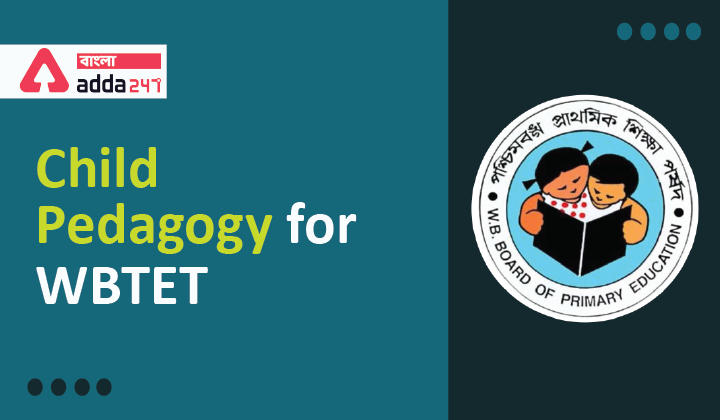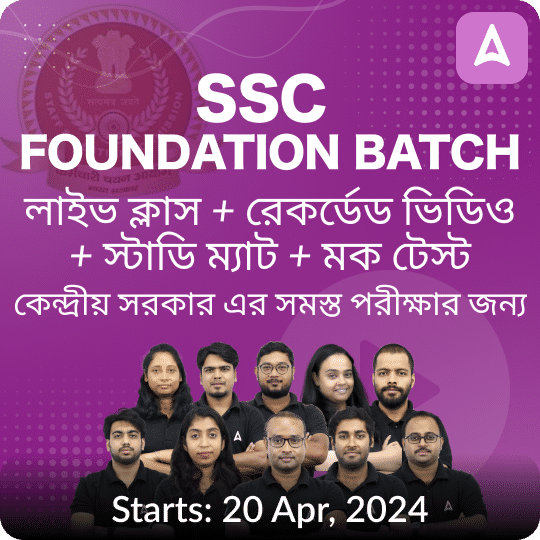Table of Contents
Child Pedagogy MCQ (শিশু শিক্ষাবিদ্যা MCQ): Child Pedagogy MCQ is very important for WBTET exam. You get here daily Child Pedagogy MCQ. Everyday you get 10 Child Pedagogy Question & Solution. It is necessary for upcoming teaching exam.
Child Pedagogy MCQ(শিশু শিক্ষাবিদ্যা MCQ)
Q1. “কালেক্টিভ আনকনসিয়াস ” ধারণাটি _______________ দিয়েছিলেন।
(a) পাভলভ
(b) স্কিনার
(c) ফ্রয়েড
(d) জং
Q2. “ইরোস” শব্দটি _______________ এর সাথে সম্পর্কিত।
(a) জীবন প্রবৃত্তি
(b) মৃত্যু প্রবৃত্তি
(c) ভয়ের প্রবৃত্তি
(d) সাধারণ প্রবৃত্তি
Q3. “অহং” দ্বারা পরিচালিত হয় –
(a) আনন্দ নীতি
(b) বাস্তবতা নীতি
(c) আদর্শবাদী নীতি
(d) সাধারণ নীতি
Q4. কোলেসিস্টোকিনিন একটি হরমোন যা মানবদেহে প্রবেশ করানো হলে –
(a) ক্ষুধা বাড়ায়
(b) ক্ষুধা ও তৃষ্ণা বাড়ায়
(c) ক্ষুধা কমে যায়
(d) ক্ষুধা ও তৃষ্ণা কমায়
Check More: Kolkata Police SI & Sergeant 2022 Free Mock
Q5. 16 বছরের একটি শিশু আইকিউ পরীক্ষায় 75 স্কোর করে, তার মানসিক বয়স হবে _______________ বছর।
(a) 12
(b) 8
(c) 14
(d) 15
Q6. কেন্দ্রীয় স্নায়ুতন্ত্র _______________ নিয়ে গঠিত।
(a) সমস্ত অঙ্গ
(b) মস্তিষ্ক
(c) মেরুদন্ডী
(d) মস্তিষ্ক এবং মেরুদণ্ড
Q7. ব্যক্তিত্বের সামাজিক শিক্ষা তত্ত্ব দিয়েছেন –
(a) বান্দুরা ও ওয়াল্টার্স
(b) ডলার এবং মিলার
(c) কার্ল রজার্স
(d) জং
Q8. সৃজনশীলতা শনাক্ত করার জন্য ‘সৃজনশীল চিন্তার পরীক্ষা’ কে প্রণয়ন করেন?
(a) মেরিফিল্ড
(b) টরেন্স
(c) কোল এবং ব্রুস
(d) কেন্ট
Q9. থর্নডাইকের তত্ত্ব নিচের কোন বিভাগের অধীনে পড়ে?
(a) আচরণগত তত্ত্ব
(b) জ্ঞানীয় তত্ত্ব
(c) মনোবিশ্লেষণ তত্ত্ব
(d) এর কোনটিই নয়
Q10. নিচের কোনটি পরিমাপ করতে মিরর ড্রয়িং টেস্ট ব্যবহার করা হয়?
(a) ব্যক্তিত্ব
(b) বুদ্ধিমত্তা
(c) শিখন
(d) নৈতিকতা
Read Also: Top 10 Tourist Places in India 2022, Study Material For WBCS and Other State Exams
Child Pedagogy MCQ Solution
S1. Ans.(d)
Sol. Collective unconscious, term introduced by psychiatrist Carl Jung to represent a form of the unconscious (that part of the mind containing memories and impulses of which the individual is not aware) common to mankind as a whole and originating in the inherited structure of the brain.
S2. Ans.(a)
Sol. Eros and Thanatos—Freud identifies two drives that both coincide and conflict within the individual and among individuals. Eros is the drive of life, love, creativity, and sexuality, self-satisfaction, and species preservation.
S3. Ans.(b)
Sol. The ego, according to Freud, develops as a child becomes aware of her individuality and separates from her parents. Ego anxiety occurs when the id and superego place conflicting demands on the central personality or ego. According to Sigmund Freud, the ego is the psychological component of the personality that is represented by our conscious decision-making process. The ego is controlled by the reality principle, which is the idea that the desires of the id must be satisfied in a method that is both socially appropriate and realistic.
S4. Ans.(c)
Sol. Cholecystokinin’s most recognized function is its ability to improve digestion. The hormone reduces the rate at which food empties from the stomach, also stimulating bile production in the liver. Bile shrinks the fat droplets, enabling enzymes to more readily break them down.
S5. Ans.(a)
Sol. A child of 16 years scores 75 in an IQ test, his mental age will be 12 years.
S6. Ans.(d)
Sol. The central nervous system consists of the brain and spinal cord. The brain plays a central role in the control of most bodily functions, including awareness, movements, sensations, thoughts, speech, and memory. Some reflex movements can occur via spinal cord pathways without the participation of brain structures.
S7. Ans.(a)
Sol. Psychologist Albert Bandura developed the social learning theory as an alternative to the earlier work of fellow psychologist B.F. Skinner, known for his influence on behaviorism. Albert Bandura’s social learning theory suggests that observation and modeling play a primary role in how and why people learn. Bandura’s theory goes beyond the perception of learning being the result of direct experience with the environment.
S8. Ans.(b)
Sol. The TTCT (Torrance Tests of Creative Thinking) assess how creatively a child’s mind works and are often given to children to determine advanced placement or as part of an entrance examination. Children are scored on a number of aspects. This includes: Creative titles for pictures.
S9. Ans.(a)
Sol. Thorndike’s theory falls under ‘Behaviouristic theory’ as: The approach which describes learning as a connection between stimulus and response is the behaviouristic approach.
S10. Ans.(c)
Sol. The Mirror-drawing or Mirror-tracing test is a psychological assessment used to measure the rate of learning, hand-eye coordination, and neuropsychological damage.
Read More :
WBPSC Clerkship Preliminary Exam 2022 Previous Year Question Paper
Kolkata Police Recruitment 2022 Eligibility Criteria
West Bengal Co-Operative Service Commission Exam 2022 Postponed
WBCS 2021 Notification (WBCS 2021 বিজ্ঞপ্তি)
পশ্চিমবঙ্গ পুলিশ কনস্টেবল রেজাল্ট 2021
Kolkata Police Syllabus 2022 Download PDF Click here
Child Pedagogy প্রতিদিন ADDA 247 বাংলা 10 টি করে MCQ সহ Answers এবং Solution দিচ্ছে। WB TET, CTET পরীক্ষার জন্য Child Pedagogy অত্যন্ত গুরুত্বপূর্ণ। এছাড়া History, Geography, Physics, Chemistry, Biology, Economics, Polity এবং Daily Reasoning এর নতুন নতুন অনেক MCQ পরীক্ষার্থীদের সকল প্রতিযোগিতামূলক পরীক্ষায় সাফল্য আনতে সাহায্য করবে। প্রতিযোগিতামূলক উত্তীর্ণ হওয়ার চাবিকাঠি Mathematics এবং Reasoning। Daily Mathematics এবং Reasoning প্র্যাক্টিস যেকোনো পরীক্ষার্থীকে সাফল্যের দোরগোড়ায় পৌঁছে দেবে।
Watch More on YouTube:
Adda247 ইউটিউব চ্যানেল – Adda247 Youtube Channel
Adda247 টেলিগ্রাম চ্যানেল – Adda247 Telegram Channel












